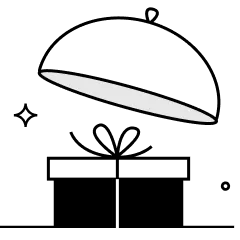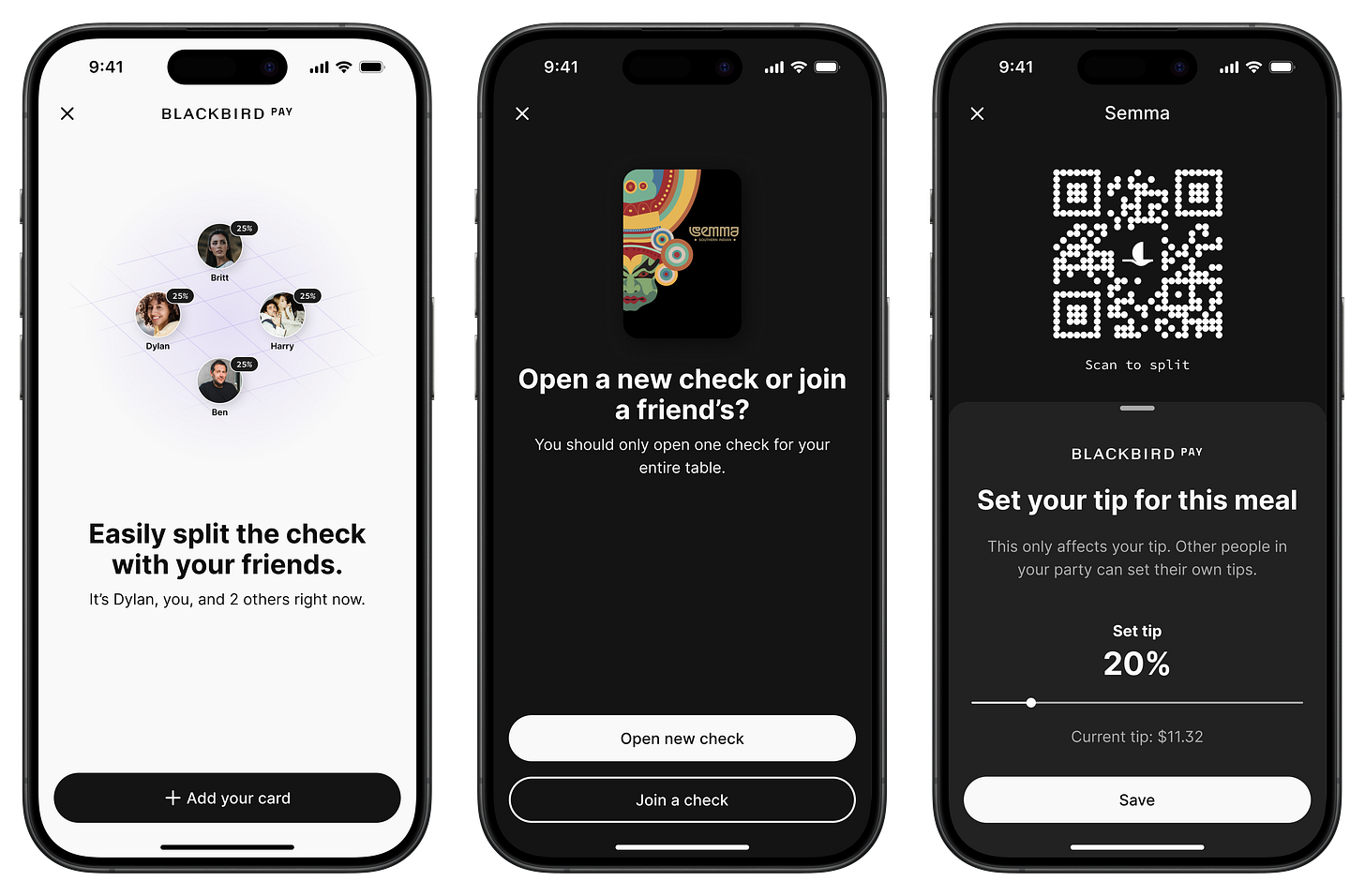Unapologetic Opinions: The Check Needs to Change
"[The check] is a deterrent from the normal flow of experiences ... it takes me away from my normal journey that the restaurant wanted me to have." - Roni Mazumdar of Unapologetic Foods
Welcome to The Supersonic, Blackbird’s newsletter for the restaurant-obsessed. If this is your first time with us, please enjoy a subscription on the house.
Good hospitality requires a certain sleight of hand. That’s not to say a memorable meal is a gimmick, far from it, but many of the details undergirding the experience are best left behind the scenes.
Operators do a good job of this, except for one thing: how we pay. It’s still largely a cat-and-mouse game with your server the second you decide you’re ready to go. Splitting the check? Oof, math.
With the launch this week of Blackbird Pay, a new feature that seamlessly allows our users to open a tab, split the bill, and add the tip, all from the app, plus walk out when their meal is finished without ever waiting for the check (allow us to set up your account right here), we’ve obviously got pay on the mind. Not only does the typical payment process feel antiquated, it’s also disruptive of the entire dining experience, and is a detail that restaurateurs sweat. For insights, we turned to Roni Mazumdar of Unapologetic Foods, whose Michelin starred Semma is currently on Blackbird. Below, the deep dive.
Ben Leventhal
So let me ask you this: we’re rolling out payments, and I think from the consumer perspective, paying the bill is kind of a painful last moment in the restaurant, isn’t it? Flagging down your server, waiting for the check, splitting the bill. It can be a really anxious and transactional moment. Riad from Le Rock gave me this terminology that I think is so apt: everyone at the table is thinking, ‘All right, here we go, time to do the check thing.’
Roni Mazumdar
Absolutely. Fast-forward to the end of the meal, and hopefully it’s been an amazing experience, but now it starts to feel transactional. Our vision as a restaurant group is to really leave an emotional impact on individuals, and somewhere that emotion gets a little bit sidelined is when the payment conversation comes up. The overall experience becomes a little bit wobbly. I find an opportunity with Blackbird to be able to change that.
BL
That lack of control in the end, is that something that is painful for you? Do you spend time thinking: ‘wow, I wish we could do better with that last impression?’
RM
Yes! Think of how many ways people think about presenting a check. Did you get the right container? The right little leather-bound book? Also, think about all the choices that your guest has to make – the tip etc. It's not just a singular decision. That guest is being forced to get out of a completely different mind space that they were in during the meal. The check breaks the fourth wall a little bit.
BL
Right. Tell me about how you guys design that check presenter. Do you take it as seriously as picking plates?
RM
We look at every aspect of it as seriously as possible. It's funny, we have tried little cards. I don't think we have ever gotten it right. I don't think there's a single system that we have set up to date that really feels amazing. You could bring it out in a little jar that belonged to your grandmother, but there’s still the check inside that you have to pay for! No matter what we do, it doesn't change the guest’s emotions. It's not like there is another option. There’s no Uber model. So, no, to answer your question, I haven't really found the best way to present the check yet. If somebody has, I would love to know.
BL
Maybe that is the answer: the right check presenter doesn’t exist. Or, to reframe, the right check presenter is no check presenter.
RM
We want everybody to believe that they are a guest. But you're still giving that check at the end of the meal. At my house, I don't do that. The check disrupts the experience we’ve been trying to create for you. And then, after the bill is paid, we’re saying, ‘ok, let’s get back to it.’ I want you to remember me the way we did 99 percent of the work. It's a little bit of a tricky scenario.
BL
I've never exactly thought about it that way but it's so true. It's sort of like you have to pause your journey and go into this very clinical, very generic, almost sterile setting to pay, and then hopefully you kind of catch another three minutes of the journey on the other side leaving the person in a good spot.
RM
When you buy a ticket, it’s for an expected experience. Here it’s different.
BL
I love this conversation because, as we talk about this, I'm reminded of it just being another example of where technology has sort of gotten in the way of things. When I was growing up, my family went to one of three restaurants on a Sunday night where we were regulars. The check would hit the table and the server would add everything up by calculator. You had a restaurant’s brand on the top of the check. So even though you were paying, it was still part of the restaurant. You saw that the restaurant had decided ‘this is what the check is going to look like.’ Now the restaurant decides what the check presenter is going to be, but you have this bill that's printed on incredibly unpleasant paper from these printers. It's just so different now.
RM
We all want the restaurant experience to be invaluable; to be considered on an emotional level. That's the whole lore of what restaurants are. There’s this romanticism. But I think the moment you are calculating a value, a value that needs to be taken care of right there on the spot, subconsciously you, as the guest, are attaching the value to that meal that you might not have otherwise. As opposed to walking away and being given the chance to complete that experience. I think the timing of the check is a little bit off.
BL
I often think about behavioral science. There's this thing called the peak-end rule, which says in your experiences in life you remember two things: the peak and the end. I think that's so true. And I'm struck by the fact that in this context of talking about paying the check, that check moment, restaurants are sort of behind the eight ball; the end is only half in your control.
RM
Yeah, and I think the fact of not having that control is something that's a bit challenging for most restaurants. I don't think we should look at payments as only negative. But what we should consider is that the traditional check is still a tangent or a deterrent from the normal flow of experiences that you're going through. It takes me away from my normal journey that the restaurant wanted me to have.
BL
You guys have these fine dining restaurants, and you have quick serve restaurants. Is there a virtue in ordering and paying up front and then waiting for your food? Have you detected anything?
RM
Listen, I think a fast casual experience is very different. But paying up front, we like it a little bit more. And the reason we do is because it gets it out of the way. We no longer have to worry about that.
BL
And from the consumer side, I totally agree, too. When I pay ahead of time or I'm in a place with Blackbird Pay now or I have a house account kind of construct, it's like a weight has lifted off my shoulders. I'm gonna be good. It's just smooth sailing the rest of the way. The payment anxiety is real [laughs].
RM
It depends on who I'm going out with. If it's family, that's different. But if it's a bunch of friends, and this is typical with South Asian friends, there’s this whole game of who's gonna pay? Who will outdo the other guy or girl by slipping their card ahead of time? Then the conversation starts to steer toward, ‘why did you do that?’ ‘My God, not again!’ ‘I got you next time.’ So there's all those crazy things, versus if it's a split ahead of time, if it's a little bit more seamless … Or let's say you're with a large group, say eight people are trying to pay together, and the restaurant is like, ‘we don't take more than three cards now.’ So, yeah, there's limitations from all different sides that are constantly forcing everyone to focus on that transactional moment rather than the meal, the good company, etc.
BL
I completely agree.
RM
The other factor, and we've had major conversations as an industry about this, is not just the act of the payment itself, but the aggregated amounts that we pay in actual transaction fees. As an operator, there is no sense of control one has over that. Sure, let’s say my sales are higher, maybe I can negotiate better deals with different vendors, but it's still marginal. There is almost this duopoly that exists out there that we all know about. At the end of the month, you see the ginormous bill, and that’s become a direct impact on every single restaurant’s bottom line. We've all gotten used to a status quo that doesn't actually have to be there. And there hasn't been somebody who disrupted that until now.
BL
I think we both agree that the status quo is meant to be questioned. That's why we're in this together. Thanks, Roni.






